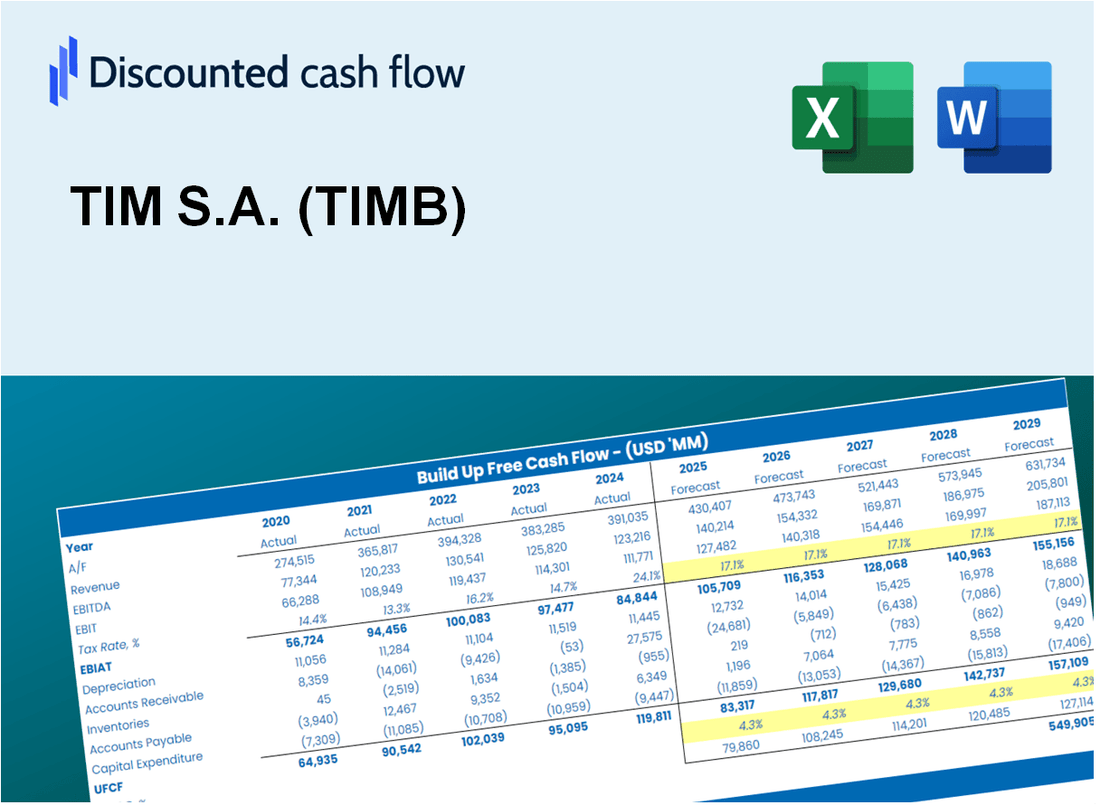
|
Valoración DCF de TIM S.A. (TIMB) |

Completamente Editable: Adáptelo A Sus Necesidades En Excel O Sheets
Diseño Profesional: Plantillas Confiables Y Estándares De La Industria
Predeterminadas Para Un Uso Rápido Y Eficiente
Compatible con MAC / PC, completamente desbloqueado
No Se Necesita Experiencia; Fáciles De Seguir
TIM S.A. (TIMB) Bundle
¿Busca evaluar el valor intrínseco de Tim S.A.? Nuestra calculadora TIMB DCF integra datos reales con características de personalización integrales, lo que le permite ajustar los pronósticos y mejorar sus estrategias de inversión.
Discounted Cash Flow (DCF) - (USD MM)
| Year | AY1 2020 |
AY2 2021 |
AY3 2022 |
AY4 2023 |
AY5 2024 |
FY1 2025 |
FY2 2026 |
FY3 2027 |
FY4 2028 |
FY5 2029 |
|---|---|---|---|---|---|---|---|---|---|---|
| Revenue | 3,260.2 | 3,409.3 | 4,065.0 | 4,499.8 | 4,804.6 | 5,300.3 | 5,847.3 | 6,450.7 | 7,116.3 | 7,850.6 |
| Revenue Growth, % | 0 | 4.58 | 19.23 | 10.7 | 6.77 | 10.32 | 10.32 | 10.32 | 10.32 | 10.32 |
| EBITDA | 1,581.2 | 1,935.4 | 2,036.2 | 2,343.0 | 2,452.3 | 2,740.0 | 3,022.7 | 3,334.6 | 3,678.7 | 4,058.4 |
| EBITDA, % | 48.5 | 56.77 | 50.09 | 52.07 | 51.04 | 51.69 | 51.69 | 51.69 | 51.69 | 51.69 |
| Depreciation | 1,043.5 | 1,074.6 | 1,289.0 | 1,343.7 | 1,326.5 | 1,618.8 | 1,785.8 | 1,970.1 | 2,173.4 | 2,397.7 |
| Depreciation, % | 32.01 | 31.52 | 31.71 | 29.86 | 27.61 | 30.54 | 30.54 | 30.54 | 30.54 | 30.54 |
| EBIT | 537.7 | 860.9 | 747.3 | 999.3 | 1,125.8 | 1,121.2 | 1,236.9 | 1,364.5 | 1,505.3 | 1,660.7 |
| EBIT, % | 16.49 | 25.25 | 18.38 | 22.21 | 23.43 | 21.15 | 21.15 | 21.15 | 21.15 | 21.15 |
| Total Cash | 877.1 | 1,849.6 | 894.8 | 950.9 | 1,074.9 | 1,554.8 | 1,715.2 | 1,892.2 | 2,087.5 | 2,302.9 |
| Total Cash, percent | .0 | .0 | .0 | .0 | .0 | .0 | .0 | .0 | .0 | .0 |
| Account Receivables | 924.4 | 904.8 | 881.9 | 992.9 | 889.6 | 1,242.0 | 1,370.2 | 1,511.6 | 1,667.6 | 1,839.7 |
| Account Receivables, % | 28.35 | 26.54 | 21.7 | 22.06 | 18.51 | 23.43 | 23.43 | 23.43 | 23.43 | 23.43 |
| Inventories | 46.6 | 38.2 | 44.6 | 62.6 | 55.4 | 65.6 | 72.4 | 79.9 | 88.1 | 97.2 |
| Inventories, % | 1.43 | 1.12 | 1.1 | 1.39 | 1.15 | 1.24 | 1.24 | 1.24 | 1.24 | 1.24 |
| Accounts Payable | 590.7 | 616.9 | 800.0 | 870.8 | 941.5 | 1,005.4 | 1,109.1 | 1,223.6 | 1,349.8 | 1,489.1 |
| Accounts Payable, % | 18.12 | 18.09 | 19.68 | 19.35 | 19.6 | 18.97 | 18.97 | 18.97 | 18.97 | 18.97 |
| Capital Expenditure | -734.7 | -997.6 | -893.1 | -850.4 | -859.1 | -1,171.9 | -1,292.8 | -1,426.2 | -1,573.3 | -1,735.7 |
| Capital Expenditure, % | -22.54 | -29.26 | -21.97 | -18.9 | -17.88 | -22.11 | -22.11 | -22.11 | -22.11 | -22.11 |
| Tax Rate, % | 12.94 | 12.94 | 12.94 | 12.94 | 12.94 | 12.94 | 12.94 | 12.94 | 12.94 | 12.94 |
| EBITAT | 493.4 | 820.3 | 725.5 | 890.5 | 980.2 | 1,032.2 | 1,138.7 | 1,256.2 | 1,385.9 | 1,528.9 |
| Depreciation | ||||||||||
| Changes in Account Receivables | ||||||||||
| Changes in Inventories | ||||||||||
| Changes in Accounts Payable | ||||||||||
| Capital Expenditure | ||||||||||
| UFCF | 422.0 | 951.5 | 1,320.9 | 1,325.6 | 1,628.8 | 1,180.3 | 1,600.6 | 1,765.8 | 1,948.0 | 2,149.0 |
| WACC, % | 9.88 | 10.18 | 10.34 | 9.66 | 9.49 | 9.91 | 9.91 | 9.91 | 9.91 | 9.91 |
| PV UFCF | ||||||||||
| SUM PV UFCF | 6,403.3 | |||||||||
| Long Term Growth Rate, % | 2.00 | |||||||||
| Free cash flow (T + 1) | 2,192 | |||||||||
| Terminal Value | 27,709 | |||||||||
| Present Terminal Value | 17,275 | |||||||||
| Enterprise Value | 23,679 | |||||||||
| Net Debt | 2,332 | |||||||||
| Equity Value | 21,347 | |||||||||
| Diluted Shares Outstanding, MM | 97 | |||||||||
| Equity Value Per Share | 220.51 |
What You Will Get
- Real TIMB Financial Data: Pre-filled with TIM S.A.’s historical and projected data for precise analysis.
- Fully Editable Template: Modify key inputs like revenue growth, WACC, and EBITDA % with ease.
- Automatic Calculations: See TIM S.A.’s intrinsic value update instantly based on your changes.
- Professional Valuation Tool: Designed for investors, analysts, and consultants seeking accurate DCF results.
- User-Friendly Design: Simple structure and clear instructions for all experience levels.
Key Features
- Customizable Financial Inputs: Adjust essential parameters such as revenue growth, EBITDA %, and capital expenditures for TIM S.A. (TIMB).
- Instant DCF Valuation: Automatically computes intrinsic value, NPV, and other key metrics for TIM S.A. (TIMB) with ease.
- High-Precision Accuracy: Leverages TIM S.A. (TIMB)'s actual financial data for precise valuation results.
- Effortless Scenario Analysis: Explore various assumptions and evaluate different outcomes for TIM S.A. (TIMB) effortlessly.
- Efficiency Booster: Remove the hassle of constructing intricate valuation models from the ground up for TIM S.A. (TIMB).
How It Works
- Step 1: Download the Excel file.
- Step 2: Review TIM S.A.'s pre-filled financial data and forecasts.
- Step 3: Modify critical inputs like revenue growth, WACC, and tax rates (highlighted cells).
- Step 4: Watch the DCF model update instantly as you tweak assumptions.
- Step 5: Analyze the outputs and use the results for investment decisions regarding TIM S.A. (TIMB).
Why Choose This Calculator for TIM S.A. (TIMB)?
- Designed for Industry Experts: A sophisticated tool utilized by financial analysts, CFOs, and consultants in the telecommunications sector.
- Accurate Financial Data: TIM S.A.’s historical and projected financials are preloaded to ensure precision.
- Flexible Scenario Analysis: Effortlessly test various forecasts and assumptions to see potential outcomes.
- Comprehensive Results: Automatically computes intrinsic value, NPV, and essential financial metrics.
- User-Friendly Interface: Step-by-step guidance makes the process straightforward and accessible.
Who Should Use TIM S.A. (TIMB)?
- Investors: Make informed investment choices with TIM S.A. (TIMB)'s reliable market insights.
- Financial Analysts: Streamline your analysis with comprehensive data and tools tailored for TIM S.A. (TIMB).
- Consultants: Easily modify resources for client assessments or strategic presentations involving TIM S.A. (TIMB).
- Finance Enthusiasts: Enhance your knowledge of telecommunications market dynamics through TIM S.A. (TIMB) case studies.
- Educators and Students: Utilize TIM S.A. (TIMB) materials as a valuable resource in finance and business education.
What the Template Contains
- Preloaded TIMB Data: Historical and projected financial data, including revenue, EBIT, and capital expenditures.
- DCF and WACC Models: Professional-grade sheets for calculating intrinsic value and Weighted Average Cost of Capital.
- Editable Inputs: Yellow-highlighted cells for adjusting revenue growth, tax rates, and discount rates.
- Financial Statements: Comprehensive annual and quarterly financials for deeper analysis.
- Key Ratios: Profitability, leverage, and efficiency ratios to evaluate performance.
- Dashboard and Charts: Visual summaries of valuation outcomes and assumptions.
Disclaimer
All information, articles, and product details provided on this website are for general informational and educational purposes only. We do not claim any ownership over, nor do we intend to infringe upon, any trademarks, copyrights, logos, brand names, or other intellectual property mentioned or depicted on this site. Such intellectual property remains the property of its respective owners, and any references here are made solely for identification or informational purposes, without implying any affiliation, endorsement, or partnership.
We make no representations or warranties, express or implied, regarding the accuracy, completeness, or suitability of any content or products presented. Nothing on this website should be construed as legal, tax, investment, financial, medical, or other professional advice. In addition, no part of this site—including articles or product references—constitutes a solicitation, recommendation, endorsement, advertisement, or offer to buy or sell any securities, franchises, or other financial instruments, particularly in jurisdictions where such activity would be unlawful.
All content is of a general nature and may not address the specific circumstances of any individual or entity. It is not a substitute for professional advice or services. Any actions you take based on the information provided here are strictly at your own risk. You accept full responsibility for any decisions or outcomes arising from your use of this website and agree to release us from any liability in connection with your use of, or reliance upon, the content or products found herein.
